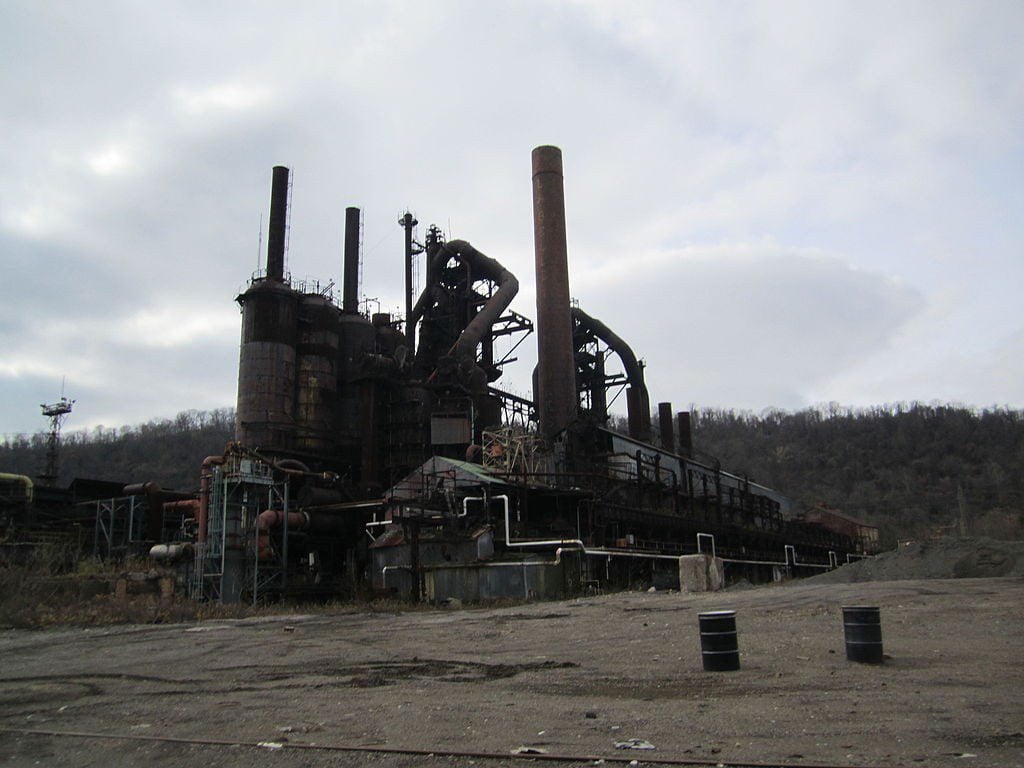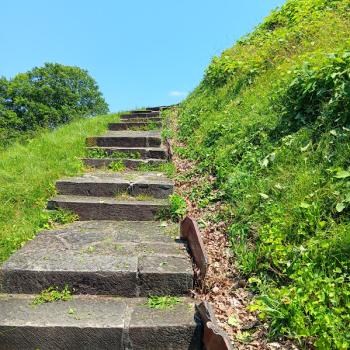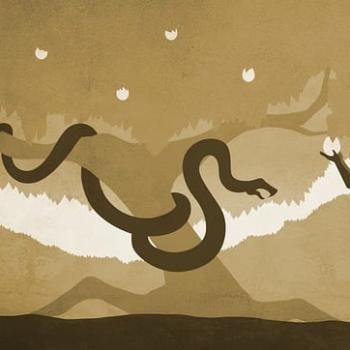
It was another sunny day, a good day for a drive. I took Rosie to Wellsville, to show her where we bought her plaid coat when she was a baby. I took her to the park and to the marina to see the fish. She brought a jar which she kept dipping into the water ever time the schools of minnows came close to the surface, but they were too clever for her. She didn’t catch a single fish.
When the fishing expedition was over, I didn’t feel like going home just yet. We drove further south, halfway to Wheeling, stopping to play in the park in the inauspiciously named town of Beech Bottom. As far as I could see it was all the same– the Appalachian mountains to the left, the noxious Ohio river to the right, giant rusted mills belching smoke every so often. Trailer parks. Storage garages. Protestant churches advertising faith healing on the kiosks out front. Noisy trains. Most of West Virginia is beautiful, but the chimney of the state is not. If I had unlimited gas money and money to get lunches on the go, I would just keep driving indefinitely until I got to Greenbrier County where my Irish Catholic ancestors lived, or Pocahontas County where we met at the state park for family reunions. Or I might drive the opposite direction, to good old Columbus where I grew up or to Darke County on the Indiana border, where my German Protestant ancestors lived. As it is, I had no money and half a tank of gas, so I drove Rosie to Beech Bottom and back to Steubenville.
I said in a post earlier this week that I would be sad pretty soon, and I am sad now.
Part of me assumed that, after we got a car and I got used to driving, we would find a new Byzantine Catholic parish, transfer rites, get Rosie Chrismated, and go back to the liturgies I loved. Part of me held onto that fantasy for the past three years. After the disaster liturgy on Saturday night, I think that fantasy is finally dead. I’m Latin Catholic, I sneak in the backs of churches afraid to be seen, and I don’t like it very much.
I assumed we would eventually find a community we liked, where we could serve God together and be good to one another. Rosie could have catechism lessons and lots of play dates, and Michael and I could have a circle of friends. But just now, I can’t imagine that will happen. Not even if we could somehow afford to move out of Steubenville. The Valley isn’t just Steubenville. It goes on and on for as far as I can see. The Valley is all there is. That’s not a very good feeling.
God is everywhere present and filling all things. There’s nowhere I’ve ever been where God wasn’t. Every time I’ve been good and determined to be an atheist or at least an agnostic, there He is again and I fail. There’s no getting away. But constantly being the Presence of God doesn’t mean I don’t also need to show up at a church somewhere and receive sacraments.
The atmosphere is full of water. There’s water in the air no matter where you look. Nothing that breathes air is ever far from water. But you can still die of thirst if you don’t have a drink now and then.
Of course, when the water where you live is poisoned, it becomes a matter of choosing which way you’d like to die. So far, I have chosen water.
If Christ had become incarnate in Appalachia– and He has, in you and me, but I mean, if the historical event of the nativity of the Second Person of the Trinity had taken place in Appalachia in the past century instead of in Bethlehem two thousand years ago– He might have told a parable like this: God created a great big river, and that river was good. In fact that river was beautiful, it was teeming with fish, anyone who came to the river could fish and boat and swim and drink to their heart’s content. But an enemy appeared in the middle of the night and put great big dark Satanic mills along the banks of the river, and flushed the sludge from a myriad of industries into the river, and demolished the mountaintops overshadowing the river. He clear-cut the trees, mined the coal, fracked the shale and left an ungodly mess, promising that this would all be worth it when it created jobs and brought prosperity to the region, but all it caused was the occasional boom and then an economic bust. The servants of God went to Him and said, “Lord, did you not create a beautiful river? Why, then, does it smell like sulfur, and why is it the color of rust? Why does it make us sick when we drink it? Why are we in poverty and the laughingstock of the country? Why does nothing ever get better around here?” And the Lord said to them, “an enemy has done this.” The servants said, “Aren’t you going to get rid of the river?” And God said “No, because then the fish would suffocate and all the people would die of thirst. Let it keep running just as it is, and I will come down and drink that poisoned water and suffer with everyone who suffers along the river’s banks. And somehow, at the end of things, I will make this right.”
Of course, if He’d talked like that about coal and fracking in Appalachia, you can be sure they would have crucified Him just as they did in Jerusalem.
And if I talk about the Church as an enormous and badly polluted river, and God as a hillbilly who suffers with the people who live on the river, I won’t be very popular either. But that’s where I am right now. The Church is a river that God made to sustain me, and it does sustain me, and it’s also making me sick, and I think that at the end of things God will make things right.
I wish I had a braver, wiser, cleverer Mary Pezzulo to show you. I wish I had exciting adventures and happy endings to tell you about. But there is only me, in the Valley, trying to make sense of things that make no sense. Sometimes I’m learning to be happy. Sometimes I’m sad, and today is a sad day.
At the moment, the Valley is all there is.
Mary Pezzulo is the author of Meditations on the Way of the Cross and Stumbling into Grace: How We Meet God in Tiny Works of Mercy.
Steel Magnificat operates almost entirely on tips. To tip the author, visit our donate page.













